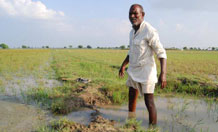Articles

Farmer in Uttar Pradesh channelling water from a canal into fields. Image courtesy of Jimmy O’Keeffe.
Researchers win major grant to lead Indian water management project
Three engineering experts from the University of Exeter have been awarded £334,000 to participate in an international partnership project enhancing the management of water resources in South Asia.
Professors Slobodan Djordjevic, Dragan Savic and Dr Diego Gomez from the department of Engineering OLD Mar24’s Centre for Water Systems won the research grant from the Natural Environment Research Council (NERC) to develop an integrated water management framework for the Indo-Gangetic Plain (IGP).
The researchers will work on the project, which is called ‘Coupled Human And Natural Systems Environment (CHANSE) for water management under uncertainty in the Indo-Gangetic Plain’, and which involves Imperial College, the University of Exeter and the British Geological Survey on the UK side and seven partners from India including the Indian Institute of Technology (IIT) in Bombay and the Indian Institute of Science (IISc) in Bangalore.
It will be one of the three new projects of a major three-year research programme called Sustaining Water Resources for Food, Energy & Ecosystem Services in India, co-funded by NERC and India's Ministry of Earth Sciences and supported by the Newton-Bhabha Fund. The other two projects will focus on Peninsular India and the Himalayan river basins.
The University of Exeter’s role will be to lead the CHANSE work package that will integrate basin-wide data and models using the System Dynamics approach, and contribute to the regional climate modelling for basin to sub-basin scale prediction of seasonal and sub-seasonal monsoon rainfall in the IGP.
The project will use the River Gandak sub-basin, which is representative of all the major issues in the larger basin, as a case study catchment for process understanding. Water management strategies and feedbacks of water allocation to local climate will be analysed at the IGP basin level.
Professor Slobodan Djordjevic said: "I am delighted that this new project builds on our strong partnerships with leading Indian institutions. Managing water resources in the Indo-Gangetic Plain is a tremendous challenge because of the basin’s uniqueness in scale, biophysical complexity and the dynamics of its institutional and socio-economic characteristics. CHANSE and the other two related projects have potential to make a substantial impact on one of the world’s largest economies, where water is the key resource for over one billion people."
The Sustaining Water Resources in India Research Programme will be launched at a workshop attended by all project partners in New Delhi on 16-17 May 2016 .
Date: 6 May 2016
